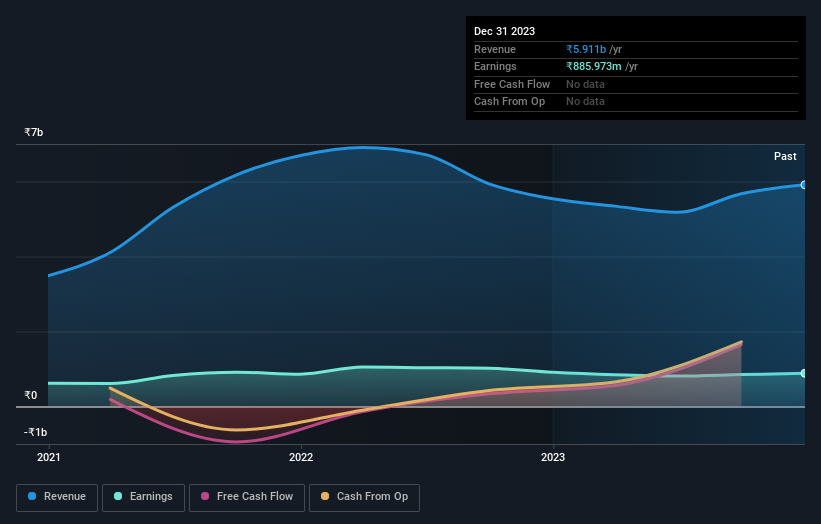Goldiam International Limited's (NSE:GOLDIAM): Top Key Executive Rashesh Bhansali is the most bullish insider, and their stock value gained 12% last week

Key Insights
- Significant insider control over Goldiam International implies vested interests in company growth
- A total of 2 investors have a majority stake in the company with 59% ownership
- Ownership research, combined with past performance data can help provide a good understanding of opportunities in a stock
Every investor in Goldiam International Limited (NSE:GOLDIAM) should be aware of the most powerful shareholder groups. We can see that individual insiders own the lion's share in the company with 69% ownership. Put another way, the group faces the maximum upside potential (or downside risk).
As a result, insiders scored the highest last week as the company hit ₹20b market cap following a 12% gain in the stock.
Let's take a closer look to see what the different types of shareholders can tell us about Goldiam International.
Check out our latest analysis for Goldiam International

What Does The Lack Of Institutional Ownership Tell Us About Goldiam International?
Small companies that are not very actively traded often lack institutional investors, but it's less common to see large companies without them.
There are multiple explanations for why institutions don't own a stock. The most common is that the company is too small relative to funds under management, so the institution does not bother to look closely at the company. Alternatively, there might be something about the company that has kept institutional investors away. Goldiam International's earnings and revenue track record (below) may not be compelling to institutional investors -- or they simply might not have looked at the business closely.

We note that hedge funds don't have a meaningful investment in Goldiam International. Because actions speak louder than words, we consider it a good sign when insiders own a significant stake in a company. In Goldiam International's case, its Top Key Executive, Rashesh Bhansali, is the largest shareholder, holding 43% of shares outstanding. In comparison, the second and third largest shareholders hold about 16% and 5.0% of the stock. Interestingly, the second-largest shareholder, Anmol Bhansali is also Chief Executive Officer, again, pointing towards strong insider ownership amongst the company's top shareholders.
To make our study more interesting, we found that the top 2 shareholders have a majority ownership in the company, meaning that they are powerful enough to influence the decisions of the company.
Researching institutional ownership is a good way to gauge and filter a stock's expected performance. The same can be achieved by studying analyst sentiments. We're not picking up on any analyst coverage of the stock at the moment, so the company is unlikely to be widely held.
Insider Ownership Of Goldiam International
While the precise definition of an insider can be subjective, almost everyone considers board members to be insiders. Management ultimately answers to the board. However, it is not uncommon for managers to be executive board members, especially if they are a founder or the CEO.
Insider ownership is positive when it signals leadership are thinking like the true owners of the company. However, high insider ownership can also give immense power to a small group within the company. This can be negative in some circumstances.
Our most recent data indicates that insiders own the majority of Goldiam International Limited. This means they can collectively make decisions for the company. So they have a ₹14b stake in this ₹20b business. Most would argue this is a positive, showing strong alignment with shareholders. You can click here to see if those insiders have been buying or selling.
General Public Ownership
The general public-- including retail investors -- own 30% stake in the company, and hence can't easily be ignored. This size of ownership, while considerable, may not be enough to change company policy if the decision is not in sync with other large shareholders.
Next Steps:
While it is well worth considering the different groups that own a company, there are other factors that are even more important. For instance, we've identified 1 warning sign for Goldiam International that you should be aware of.
If you would prefer check out another company -- one with potentially superior financials -- then do not miss this free list of interesting companies, backed by strong financial data.
NB: Figures in this article are calculated using data from the last twelve months, which refer to the 12-month period ending on the last date of the month the financial statement is dated. This may not be consistent with full year annual report figures.
New: Manage All Your Stock Portfolios in One Place
We've created the ultimate portfolio companion for stock investors, and it's free.
• Connect an unlimited number of Portfolios and see your total in one currency
• Be alerted to new Warning Signs or Risks via email or mobile
• Track the Fair Value of your stocks
Have feedback on this article? Concerned about the content? Get in touch with us directly. Alternatively, email editorial-team (at) simplywallst.com.
This article by Simply Wall St is general in nature. We provide commentary based on historical data and analyst forecasts only using an unbiased methodology and our articles are not intended to be financial advice. It does not constitute a recommendation to buy or sell any stock, and does not take account of your objectives, or your financial situation. We aim to bring you long-term focused analysis driven by fundamental data. Note that our analysis may not factor in the latest price-sensitive company announcements or qualitative material. Simply Wall St has no position in any stocks mentioned.
About NSEI:GOLDIAM
Goldiam International
Manufactures, sells, and trades in diamond studded gold, silver, and platinum jewelry in India.
Flawless balance sheet with solid track record.
Similar Companies
Market Insights
Community Narratives




